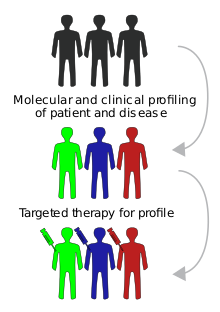Targeted therapy
As a form of molecular medicine, targeted therapy blocks the growth of cancer cells by interfering with specific targeted molecules needed for carcinogenesis and tumor growth,[2] rather than by simply interfering with all rapidly dividing cells (e.g. with traditional chemotherapy).Targeted cancer therapies are expected to be more effective than older forms of treatments and less harmful to normal cells.Many targeted therapies are examples of immunotherapy (using immune mechanisms for therapeutic goals) developed by the field of cancer immunology.[3] One of the most successful molecular targeted therapeutics is imatinib, marketed as Gleevec, which is a kinase inhibitor with exceptional affinity for the oncofusion protein BCR-Abl which is a strong driver of tumorigenesis in chronic myelogenous leukemia.[6] Co-targeted therapy involves the use of one or more therapeutics aimed at multiple targets, for example PI3K and MEK, in an attempt to generate a synergistic response[5] and prevent the development of drug resistance.

pharmacotherapycancerhormonal therapycytotoxicchemotherapymolecular medicinecancer cellsmoleculescarcinogenesisrapidly dividing cellsbiopharmaceuticalsantibody-drug conjugatesimmunotherapycancer immunologyimmunomodulatorsbiological response modifiersimatinibBCR-Ablchronic myelogenous leukemialung cancercolorectal cancerhead and neck cancerbreast cancermultiple myelomalymphomaprostate cancermelanomascare quotessmall moleculesmonoclonal antibodiestyrosine-kinase inhibitorsgastrointestinal stromal tumordermatofibrosarcoma protuberansGefitinibepidermal growth factor receptortyrosine kinaseErlotinibSorafenibSunitinibDasatinibLapatinibNilotinibBosutinibPonatinibAsciminibBortezomibapoptosisproteasome inhibitorselective estrogen receptor modulatortamoxifenJanus kinase inhibitorstofacitinibALK inhibitorscrizotinibBcl-2 inhibitorsvenetoclaxobatoclaxnavitoclaxgossypolPARP inhibitorsolaparibrucaparibniraparibtalazoparibPI3K inhibitorsperifosineApatinibVEGF Receptorgastric carcinomahepatocellular carcinomaZoptarelin doxorubicin (AN-152)doxorubicinBraf inhibitorsvemurafenibdabrafenibLGX818MEK inhibitorstrametinibMEK162CDK inhibitorsPD-0332991LEE011Hsp90 inhibitorsHedgehog pathway inhibitorsvismodegibsonidegibSalinomycincancer stem cellsglioblastomaovarian cancerclinical trialsIbrutinibmantle cell lymphomachronic lymphocytic leukemiaWaldenström's macroglobulinemiaVintafolideSerine/threonine kinaseTemsirolimusEverolimusMonoclonal antibody therapyPembrolizumabHodgkin's lymphomanon-small cell lung carcinomaRituximabTrastuzumabHer2/neuAlemtuzumabCetuximabsquamous cell carcinoma of the head and neckPanitumumabBevacizumabcolon cancernon-small cell lung cancersarcomabrain tumorsIpilimumabBrentuximabantibody-directed enzyme prodrug therapyNational Cancer InstituteTargeted drug deliveryTargeted molecular therapy for neuroblastomaTargeted therapy of lung cancerTargeted covalent inhibitorsBibcodeNew York TimesJournal of Clinical Oncology